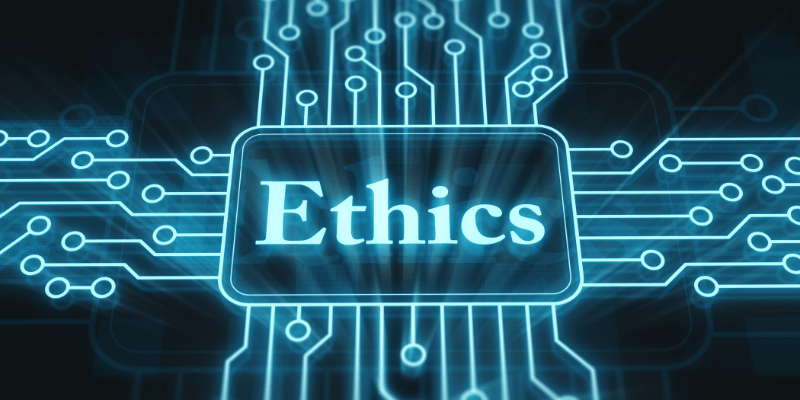9th July 25
Generative AI is rapidly reshaping industries, offering unprecedented opportunities for innovation and efficiency. But as this powerful technology becomes more integrated into our professional lives, a critical question arises: how do we ensure it's used responsibly?
For business professionals looking to leverage AI, understanding AI ethics and addressing bias in AI are not just theoretical concerns; they are essential for sustainable growth and career advancement. Let’s take a look at generative AI in society, exploring ethical considerations, bias, and responsible innovation.
The dual nature of AI: Is AI good or bad?
The advent of AI has sparked a global conversation: is AI good or bad? The reality is, generative AI is a tool, and like any tool, its impact depends on how it's wielded. It can drive incredible progress, from automating mundane tasks to sparking creativity in marketing and design. However, without careful consideration, it can also amplify existing societal issues. This brings us to a crucial point: what societal and ethical problems does generative AI pose?

Unpacking the ethical considerations of generative AI
The ethics of AI are complex, touching upon areas from data privacy to intellectual property.
What are the ethical considerations and responsible use of generative AI?
Key concerns include:
Deepfakes
Generative AI can create incredibly realistic fake images, audio, and video, making it difficult to distinguish genuine content from manipulated media. For businesses, this poses a significant risk of reputational damage through malicious deepfake attacks targeting executives or brands. It also undermines trust in digital content, which is a cornerstone of modern communication and commerce. Imagine a deepfake press release or customer testimonial – the implications for trust are enormous.
Misuse of personal data
Generative AI models often require vast amounts of data for training. If this data includes personal information without proper consent or anonymisation, it raises serious privacy violations. For businesses handling customer data, this is not just an ethical breach but a legal minefield, with severe penalties under regulations like GDPR. Ensuring data privacy is paramount to maintaining customer loyalty and avoiding costly legal battles.
Content authenticity
As generative AI becomes more sophisticated, distinguishing between AI-generated content and human-created content becomes increasingly challenging. This blurs the lines of originality and authorship, creating issues around intellectual property and copyright. Businesses need to understand who owns AI-generated content and how to protect their creative assets.
The proliferation of AI-generated content can also dilute the value of human creativity and expertise, raising questions about originality and artistic integrity in industries like marketing, design, and entertainment.
As business leaders, understanding these ethical implications of AI in society is paramount. It's about more than just compliance; it's about building trust with your customers and stakeholders.
The pervasive challenge of bias in AI
One of the most pressing issues in AI is AI bias.
What are the bias concerns of generative AI?
AI models learn from the data they are fed, and if that data reflects historical societal biases, the AI will perpetuate them. This can manifest in various ways, from algorithms making unfair decisions in hiring or lending to generating discriminatory content.
Some AI bias examples include:
- Facial recognition systems that perform poorly on darker skin tones.
- Hiring algorithms that inadvertently favour certain demographics based on past hiring patterns.
- Language models that produce stereotypical or harmful content based on biased training data.
How does AI bias affect society?
It can exacerbate existing inequalities, lead to unfair outcomes, and erode public trust in technology. For business professionals, ignoring AI biases can lead to reputational damage, legal challenges, and a loss of competitive edge.
What is the negative impact of AI on ethics?
Overall, it's the risk of AI becoming a tool that harms rather than helps, undermining the very values we seek to uphold.

Accountability and responsible innovation
With the rapid emergence of AI and its associated issues, many people ask the question, “What is the biggest problem with generative AI?” Arguably, it's the challenge of ensuring accountability.
What is accountability in generative AI?
Accountability in generative AI refers to the responsibility of individuals, organisations, and systems involved in the development, deployment, and use of generative AI technologies to ensure their actions and outcomes are ethical, legal, and transparent.
Defining responsibility in complex AI systems requires clear governance frameworks and transparent development practices. The good news is that we can shape the future of AI.
How can AI be used responsibly in society?
It starts with a commitment to ethical AI design and deployment. This includes:
- Fairness: Actively working to identify and mitigate biases.
- Transparency: Understanding how AI models make decisions.
- Accountability: Establishing clear lines of responsibility for AI systems.
- Privacy: Protecting user data throughout the AI lifecycle.
This focus on ethics for AI is not just for developers; it's a strategic imperative for anyone in business.
Your next step in responsible AI
For professionals eager to truly understand and ethically leverage this transformative technology, formal education is key. A specialised AI ethics course can provide the foundational knowledge and practical insights needed to navigate the complexities of generative AI responsibly.
If you’re ready to lead the way in responsible AI innovation, our online Generative AI in Society: Ethics, Bias, and Responsible Innovation course will enable you to gain the expertise to make a positive impact in your career and beyond.
This AI certification course will equip you with a deep understanding of AI's ethical landscape, helping you identify and address bias, misinformation, and risk, and reflecting your commitment to a human-centred approach to AI.
Check out our Complete Generative AI Professional Bundle if you want to learn about ethics in AI as well as how to apply generative AI in business, development, customer service, strategy, and more!
Ready to explore our generative AI courses? Download our FREE generative AI course brochure below!




















